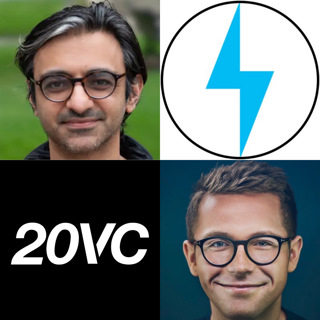
20VC: Why Crypto is Software Eating Money, Why Crypto Firms Will Outcompete Traditional Venture Firms, How To Price Tokens and When To Have Them, DAOs: How Are They Structured and What Makes One Successful with Avichal Garg, Co-Founder @ Electric Capital
Avichal Garg is Co-Founder & Partner @ Electric Capital, last month Electric announced they had raised $1BN for their new fund making them one of the largest independent and crypto-native VC firms in the world. As for Avichal, prior to Electric, he was an investor in crypto projects such as Anchorage, Bitwise, Lightning Labs, and OpenSea and unicorns such as Airtable, Cruise, Deel, Figma, Notion and many more. On the operating side, Avichal successfully sold his last company to Facebook where he became Director of Product Management for the Local product group, a team of 400 engineers responsible for billions in revenue. In Today's Episode with Avichal Garg You Will Learn: 1.) Origins into Venture: How did Avichal make his way into the world of startups and angel investing? How did Avichal make the pivot from software to crypto investing? Was Avichal nervous when making the move to institutionalize what had been personal investing? What does Avichal know now that he wishes he had known at the start of Electric? 2.) The Landscape: Crypto Investing How does Avichal assess the crypto fund landscape today? Will we continue to see a small number of firms (a16z, Katie Haun, Paradigm, Electric) dominate the market? What happens to all the small crypto funds that have been raised in the last year? Why does Avichal believe crypto investing is much more collaborative than venture investing? How can venture size returns be made if the ownership levels are so much smaller? 3.) Crypto Firms vs Traditional VC Firms: Why does Avichal believe that crypto is software eating money? What does this mean for traditional venture? Who will survive? Who will die? Who will thrive? Why can generalist firms not compete with crypto native firms? How are the teams of crypto native firms structured so differently to those of traditional VCs? Do crypto projects and investments need the same level of service and help that generalist VCs provide with their platform services? 4.) Tokens - Equity - Liquidity: How does Avichal advise investors on how to think through token vs equity investing? When does it make sense to have a token vs not having a token? How are crypto tokens priced and valued? What do you need to know when buying tokens? How does the liquidity of crypto markets make it challenging for investor psychology? What is the biggest lesson Avichal has learned on when is the right time to sell? 5.) DAOs: 101 What are DAOs? Are they not just another form of government? What makes one DAO successful and another not? What tooling and infrastructure are required to manage a DAO successfully? What does Avichal believe the vision of a DAO should be? How should they define success? Item's Mentioned In Today's Episode with Avichal Garg Avichal's Favourite Book: The End of the World Is Just the Beginning: Mapping the Collapse of Globalization Avichal's Most Recent Investment: Magic Eden
11 Apr 202257min
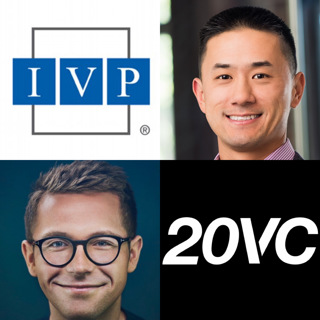
20VC: What Happens To Growth Rounds in this New Environment? Where is the Funding Crunch? How Does This Impact M&A and Going Public? How do Crossover Funds Respond? What Does it Mean For Early Stage and more with Eric Liaw, General Partner @ IVP
Eric Liaw is a General Partner @ IVP, one of the leading later-stage venture capital and growth equity firms of the last decade with $8.7 billion of committed capital and a 40-year IRR of 43.1%. At IVP eric has led investments in Datadog, Github, Klarna, Robinhood and UiPath to name a few. Prior to joining IVP, Eric was with Technology Crossover Ventures (TCV) and was actively involved in originating, executing and managing investments, including Netflix, Zillow and eHarmony. As a result of his investing success, Eric was recognized by GrowthCap as one of the Top 25 Software Investors of 2021 and 2020. In Today's Episode with Eric Liaw You Will Learn: 1.) Origins into Venture: How did Eric make his way into the world of venture way back over 20 years ago? What were some of Eric's biggest lessons from his early years at TCV? What are the most significant changes in venture over the last decade? 2.) Eric Liaw: The Investor: How has Eric changed as an investor over the last decade? What caused those changes? How does Eric reflect on his own relationship to price? How does he determine when to pay up vs when to remain disciplined? What has been Eric's biggest miss? How did it alter his style of investing? From UiPath to Supercell, what has been Eric's favourite story of travelling around the world to win a deal? 3.) The Market: Venture How does Eric expect IPO markets to behave as we move further in 2022? How does Eric expect large M&A to play out for the rest of the year? With the public markets crashing; how does this impact the large growth rounds of 2021? What does Eric expect to happen to early stage pricing with the crash at late stage? How does Eric expect crossover funds to behave in this new environment? 4.) Eric Liaw: The Person How does Eric think about being an awesome Dad and also not losing an inch on being a world class investor? How does Eric reflect on his own ego when having such large investing wins? Where does he feel he is most insecure? How did having children really impact his mindset towards investing and working with founders? Item's Mentioned In Today's Episode with Eric Liaw Eric's Favourite Book: No Rules Rules: Netflix and the Culture of Reinvention Eric's Most Recent Investment: Aiven
8 Apr 202240min
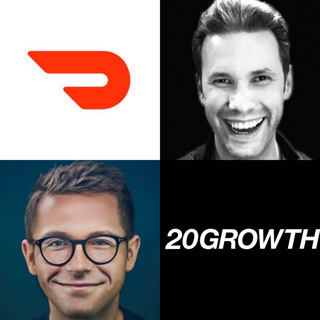
20 Growth: Why Retention Defines Product Market Fit, What is Good Retention Levels Today, The Most Counterintuitive Elements of Product and Growth & Why So Many Startups Mess Up Hiring For Growth Teams with Brian Hale, Head of Consumer Product & Growth @
Brian Hale is Vice President of Consumer Product & Growth @ Doordash. Before joining Doordash, Brian spent an incredible 10 years at Facebook, most recently as VP of Product Growth working across Instagram, Messenger, Whatsapp and more. Prior to Facebook, Brian was Director of Growth @ Uptake.com and it all started for Brian in 1999 working at ACDSee in Canada where he was asked to "figure out that search engine thing". In Today's Episode with Brian Hale You Will Learn: 1.) Brian Hale: Entry into Growth: How Brian made his way into the world of growth from being a "marine ceramic engineer"? What were 1-2 of his biggest takeaways from his 10-year journey with Facebook? What are 1-2 of the biggest misconceptions about the Facebook growth team? 2.) When is the Right Time: When is the right time for startups to hire their first growth leads or reps? How should the founder allocate resources to the growth team? Hire new designers, engineers etc for the team or pluck them from existing teams within the company? What are the biggest mistakes startups make on the timing of this hire? How can startups accurately assess whether they have product-market-fit? What levels of retention suggest PMF? How does this change by industry? 3.) Who To Hire: Step by step, how does Brian structure the interview process for all new growth hires? What are the must-ask questions for growth leaders to ask candidates in interviews? What are the clear signs and answers that suggest a 10x growth hire? How do the very best interact with data? What do they really hone in on? What literal tests does Brian do to determine the quality of a hire? How do the best perform? 4.) Onboarding and Integration: What is the optimal onboarding process for all new growth hires? What can leaders do to set their new growth teams up for success? What are the biggest ways new growth hires can mess up in the first 60 days? What have been some of the biggest challenges for Brian in his onboarding at Doordash?
6 Apr 202239min
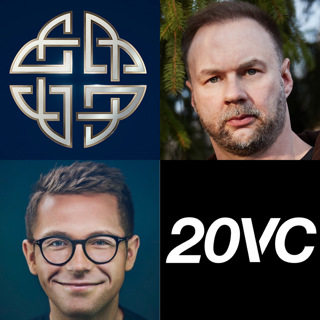
20VC: Founding Legendary Entertainment and Creating Batman, The Hangover and 300, The Importance of Luck vs Skill in Success, How Relationships to Money Change & Why Velocity is the Most Important Factor in Company Building Success with Thomas Tull
Thomas Tull is a leading entrepreneur and investor as the Founder, Chairman and CEO of Tulco, LLC. he has made notable investments in the likes of FIGS, Colossal, IL MAKIAGE, Pinterest, Zoox and Oculus Rift. Previously, Tull was the founder, CEO and Chairman of Legendary Entertainment, the film company that produced blockbusters including The Dark Knight trilogy, 300 and The Hangover franchise. Outside of his investment work, Thomas is a trustee of Carnegie Mellon University, Yellowstone Forever, the National Baseball Hall of Fame and Museum, and the Smithsonian Institution. If that was not enough, Tull is also part of the ownership group of the Pittsburgh Steelers, the six-time Super Bowl champions. In Today's Episode with Thomas Tull You Will Learn: 1.) From Laundromats to Legendary Entertainment: How did Thomas first make his way into the world of business starting with laundromats? How did growing up without money impact Thomas' early mindset? What advice does Thomas give to young people today on starting their own business? 2.) Thomas Tull: The Investor: How does Thomas approach risk today? Where is the boundary of acceptable vs unacceptable risk? How does Thomas assess his own relationship to money? How has it changed over time? How does Thomas protect himself from people and occasions where one is being used for their money or status? To what extent does Thomas believe success is luck vs skill? 3.) Legendary Entertainment: How did Thomas make his way into the movie business with the founding of Legendary Entertainment? How did Thomas first meet Chris Nolan? What did the early days of making Batman Begins look like? What were some of the most memorable times from making 300 with Gerard Butler? What were some of the most challenging elements of scaling Legendary? With the benefit of hindsight, is there anything that Thomas would do differently? 4.) The Macro: Why does Thomas believe public markets are the least rational they have ever been? From geo politics to climate change, what is Thomas most worried about today in the world? What does Thomas believe we should focus on as positives moving forward? What should we be excited about? Item's Mentioned In Today's Episode with Thomas Tull Thomas' Favourite Book: Sapiens: A Brief History of Humankind Thomas' Most Recent Investment: Colossal
4 Apr 202238min
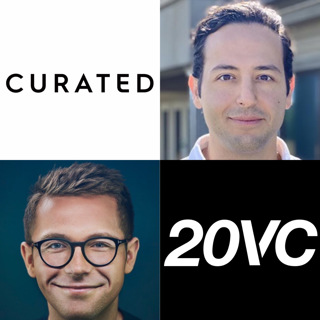
20VC: The Biggest Mistakes Startups Make Hiring, The 2 Reasons Startups Fail and How to Avoid Them, Why Most Startup Equity Plans are F****** and Why You Should Scrap Titles From Your Company with Eddie Vivas, Founder & CEO @ Curated
Eduardo Vivas is the Co-Founder and CEO @ Curated, a network where product experts monetize their passion and help consumers make the perfect purchase. To date, Eddie has raised over $141M from some of the best including CapitalG, Greylock and Forerunner to name a few. Eddie is also a stellar angel investor with a portfolio including Telegram, Truebill, AppLovin and Dollar Shave Club among others. Prior to Curated, Eddie spent 3 years at Linkedin as Head of Talent Solutions, following his startup, Bright, being acquired by them in 2014. In Today's Episode with Eddie Vivas You Will Learn: 1.) The Founding of Curated: What was the aha moment for Eddie with Curated? What were Eddie's biggest takeaways from his prior companies? What did he take with him that worked? What did he disregard that did not work? What were some of Eddie's biggest lessons from Linkedin? How did it impact his mindset? 2.) The Compound Startup: Why did Eddie decide it was right to build so much of the tooling themselves? How does Eddie determine when to buy vs build? What are the biggest mistakes Eddie sees founders making when building multiple internal tools at the same time? How does build a compound startup increase the strategic value of a company? 3.) Hiring: Missionaries not Mercenaries How does Eddie structure his hiring process at Curated? Why does he not believe that startups are for everyone? What are the biggest signals that a person is a missionary and not a mercenary? How do mercenaries act in a way that is different to missionaries? What questions in an interview process show these traits? What are some of the biggest mistakes Eddie has made when hiring? 4.) Equity and Compensation: What is Eddie's biggest advice to founders when it comes to equity allocations for the team? Why does Eddie believe it is crucial to offer and provide secondaries for the team? How does Eddie feel about the amount of secondaries founders take today so early? Item's Mentioned In Today's Episode with Eddie Vivas Eddie's Favourite Book: Predictably Irrational: The Hidden Forces That Shape Our Decisions
1 Apr 202237min
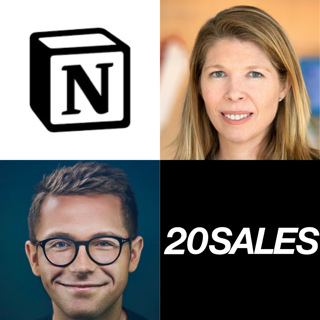
20 Sales: Notion's CRO Olivia Nottebohm on How To Build Great Operations at Your Company, How To Use The Trust Equation in Hiring, How To Do Referencing Most Effectively and Whether To Fill Seats or Wait for the Perfect Hire?
Olivia Nottebohm is the Chief Revenue Officer @ Notion where she leads the Sales, Marketing, Customer Success and Customer Experience teams. Prior to Notion, Olivia was the COO @ Dropbox where she achieved the first 4 quarters of profitable growth. Before Dropbox Olivia spent over 5 years at Google including as VP Cloud GTM Operations and Global SMB Sales. Finally, before Google, Olivia spent a whopping 15 years at McKinsey & Company. In Today's Episode with Olivia Nottebohm You Will Learn: 1.) Origins: How Olivia made her way into the world of startups and tech? What are 1-2 big takeaways Olivia has from her 5+ years at Google? How have they shaped her operating mindset today? How does Olivia balance her love for analysis and data with speed and agility of decisions? 2.) Good vs Great Operations (Ops): What does great ops really mean to Olivia? What are the 1-2 things founders can implement today to improve their ops immediately? What are the core mistakes founders make when instilling ops for the first time? How does Olivia coordinate the global Notion team to be as effective as possible? What has worked? What has not worked? 3.) The Hiring Process: Why does Olivia believe all leaders will have to accept they will not have all the talent they need over the coming years? With that in mind, is it best to hire B players or always keep the bar high? If and when can the bar be lowered? How does Olivia construct the hiring process? What are the core questions she will always ask? What is the secret to great referencing? How does Olivia enable the other side to feel safe telling her everything they know about the candidate? 4.) Cross-Functional Communication: How does Olivia advise founders on the best way to get different functions working together? What works? What does not? What are some big mistakes Olivia sees over and over? At what point in company scaling does this comms begin to breakdown? Item's Mentioned In Today's Episode with Olivia Nottebohm Grow Fast or Die Slow: The role of profitability in sustainable growth
30 Mar 202236min
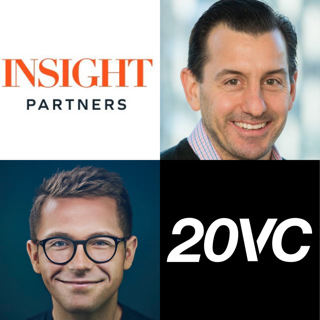
20VC: Lessons Scaling Insight Partners to a $20BN Latest Fund, The Two Biggest Learnings on Price, How to Manage and Train Young People in Venture, Why Business Classrooms Do Not Work and How to Assess the Two Commodities in Life; Money and Time with Jeff
Jeff Lieberman is the Managing Director @ Insight Partners, one of the leading investing franchises of the last 25 years with their most recent flagship fund announced earlier this year being a staggering $20BN. As for Jeff, over the last 24 years at Insight, he has led investments in leading companies such as Qualtrics, DeliveryHero, HelloFresh, Cvent, Mimecast, and Udemy. As a result of his many investing successes, he has been selected by AlwaysOn as a Venture Capital 100 winner and by Forbes as a member of the Midas List. In Today's Episode with Jeff Lieberman You Will Learn: 1.) Origins into Venture: How did Jeff's roommate at college open his eyes to the world of venture capital? What were Jeff's biggest lessons from seeing the work ethic of his parents? How does Jeff imbue the same level of ambition on his children that he had growing up with no money? Why is Jeff keen for his children not to go to college? How does he advise them? 2.) Jeff Lieberman: The Investor: What are Jeff's biggest observations on the current landscape given his seeing first hand the dot com bust and 2008? How is now different? How is it the same? Price Sensitivity: How does Jeff reflect on his own price sensitivity? How has it changed over time? Deployment Pace: How does Jeff analyse deployment pace today both for the industry and for Insight? Does Jeff agree with the notion of "playing the game on the field"? The Biggest Miss: What have been some of Jeff's biggest misses? How did those misses impact the process with which he invests? 3.) Insight: The Firm What are the most challenging elements of firm building today? Why do all juniors have control over the Partners calendars? How does this work in practice? How does Jeff create an environment of safety where very young, junior people feel like they can challenge anyone and have discussion? How do Insight train young people? What is the process? What works? What does not work? 4.) AMA: What does Jeff know now about venture that he wishes he had known when he started? What would Jeff most like to change about the world of venture capital? What advice does Jeff give to young people today entering the industry? Item's Mentioned In Today's Episode with Jeff Lieberman Jeff's Favourite Book: Man's Search For Meaning Jeff's Most Recent Investment: Choco
28 Mar 202237min
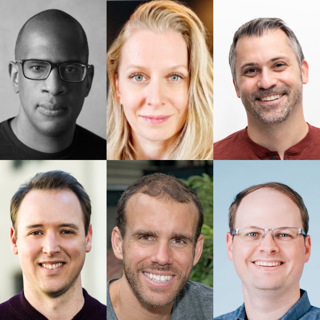
20VC The Memo: Inside the Growth Engines of Facebook, Twitter, Instagram and Instacart with the Growth Leaders Who Built Them; How Instagram Went from 440M to 1BN, How Twitter Changing Their Signup Flow was a Needlemover and How Removing Card Payment Requ
Casey Winters is the Chief Product Officer at Eventbrite where he leads the PM, product design, research, and growth marketing teams. Prior to Eventbrite, Casey spent close to 3 years at Pinterest where he led the growth product team. Andy Johns is one of the pre-eminent growth leaders of the last decade. Andy's career started in growth at Facebook when the company scaled from 100M-500M active users. Since he has worked in some of the leading growth orgs at companies like Twitter, Quora and more recently at Wealthfront as Head of Growth and President. Bangaly Kaba is the Head of Platform Growth @ Popshop Live, a live streaming mobile marketplace that combines commerce, entertainment, and social. Prior to Popshop, Bangaly led the product growth and consumer product orgs at Instacart and before Instacart was Head of Growth @ Instagram, where he built and led the product team that helped grow Instagram from 440M to > 1B monthly actives in 2.5yrs. Elena Verna is a master when it comes to all things starting and scaling growth organizations. Previously, Elena spent over 7 years as SVP Growth @ SurveyMonkey where she ran product, growth marketing, and data teams. Post SurveyMonkey, Elena worked with the rocket ship that is Miro both as Interim CMO and as an advisor. Ed Baker is an angel investor and growth advisor to various startups including Lime, Zwift, Whoop, Crimson Education, GoPeer, and Playbook. Ed was the VP of Product and Growth at Uber from 2013-2017. Prior to Uber, Ed was the Head of International Growth at Facebook. Rob Schutz is Chief Growth Officer and Co-founder at Ro, the healthcare technology company building a patient-centric healthcare system. Under Rob's growth leadership, Ro has become one of the fastest-growing companies in the country. Prior to Ro, Rob was VP of Growth at Bark, the makers of BarkBox, and helped scale revenue from zero to $100 million. In Today's Episode with Ed Baker You Will Learn: 1.) Casey Winters: How does Casey define "growth"? How does it differ from product? How do the best growth leaders decide between art vs science when making growth decisions? 2.) Andy Johns: What is Andy's biggest advice to founders looking to build their first growth team? What unexpected choice did Andy decide to make at Twitter that moved the needle for new user acquisition? 3.) Bangaly Kaba: What were some of Bangaly's biggest takeaways from scaling Instagram from 440M users to 1BN? What decisions did Bangaly make without data? How did they go? What did he learn? 4.) Ed Baker: What are Ed's biggest takeaways from facebook around structuring growth teams? What are Ed's biggest pieces of advice for startyups looking to grow internationally? What were some of Ed's biggest learnings from working with Travis @ Uber? 5.) Elena Verna: What is the difference between a good vs great growth model? When does one need to change or amend their growth model? How does one know when it is working? 6.) Rob Schutz: Why does Rob believe that startups should not diversify their customer acquisition channels too quickly? How does Rob assess resouirce allocation and spend on new channels? How did this process look when partnering with the MLB for Ro?
25 Mar 202228min






















